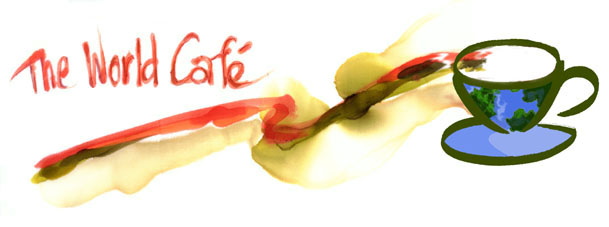|
The World Cafe
The first World
Café Video!
Using footage from interviews conducted at the World
Café Stewardship Dialogues in August, Aeron and Emmett
Miller created this video introduction to the World
Café, used in conjunction with Brazil's International
Day of Peace celebration
Description:
 What
is the World Café? What
is the World Café?
Through both our research and a decade of practice, we
have come to view the World Café as a conversational
process, based on a set of integrated design
principles that reveal a deeper living network pattern,
through which we co-evolve our collective future.
As a conversational process, the World Café is a
simple methodology that can evoke and make visible the
collective intelligence of any group, increasing
people’s capacity for effective action in pursuit of
common aims. One reason for this is that regardless of
the size of the Café, participants experience each
conversation at their table as linked and connected to
the unfolding conversation in the room as a whole. We
have successfully used it with groups of from 12 to
1200. The integrated design principles evoke
collective intelligence through dialogue. These
principles can be used in a plethora of settings
helping people at all levels of a system develop
greater collective capacity to shape their futures
through conversations that matter.
As a living network pattern, the World Café provides a
lived experience of participating in a dynamic network
of conversations that continually co-evolves as we
explore questions that matter with family, friends,
colleagues, and community. The metaphor of the “World
as Café”, helps us notice these often invisible webs
of dialogue and personal relationships that enable us
to learn, create shared purpose, and shape life-affirming
futures together.
When is the World Café useful and how does it work?
A well designed Café is useful whenever you wish to
access the intelligence and best thinking of groups.
Tens of thousands of people on six continents have
experienced the World Café in settings as disparate as
multinational corporations, small non-profits,
government agencies, community-based organizations,
and educational institutions.
In a World Café conversation, four people sit at a
café-style table or in a small conversation cluster to
explore a question or issue that matters to their life,
work or community. Other participants seated at nearby
tables or in conversation clusters explore similar
questions at the same time. As they talk, participants
are encouraged to write down key ideas on large cards
or to sketch them on paper tablecloths that are there
for that purpose.
After an initial 20 to 30 minute “round of
conversation” in these intimate groups, participants
are invited to change tables––carrying key ideas and
insights from their previous conversation into the
newly formed group. One “host” stays at each table to
share with new arrivals the key images, insights, and
questions that emerged from their prior dialogue. This
process is repeated for several (generally three)
rounds and is followed by a harvesting of the dialogue
to which all participants contribute.
The Seven Design Principles of the World Cafe are:
Clarify the Context
Create Hospitable Space
Explore Questions That Matter
Encourage Everyone's Contribution
Cross-polinate and Connect Diverse Perspectives
Listen Together for Patterns, Insights and Deeper
Questions
Harvest and Share Collective Discoveries
Applications:
Café conversations are
designed on the assumption that people already have
within them the wisdom and creativity to effectively
address even their most difficult challenges. The
World Café works because it is based on something we
all know how to do—engage in a good conversation. It
draws on the quintessential processes by which people
around the world naturally think together, create
shared meaning, strengthen community, and ignite
innovation.
The World Café enables leaders in any setting to
create generative networks of conversation focused on
the questions that are critical to the real work of
their organization or community. Given the appropriate
framing and focus, Café conversations allow
participants to access mutual intelligence in the
service of desired outcomes. Those using it often
report an unexpected leap in their collective capacity
to establish trust, nurture relationships, expand
effective knowledge, and create new possibilities for
action, even among people with no previous history of
working together. Consequently, the World Café and its
design principles have immediate, practical
implications for meeting and conference design,
strategy formation, knowledge creation, innovation,
and large-scale systems change.
As a metaphor, the World as Café helps illuminate a
core process that underpins large-scale organizational
and societal change. Throughout history, new ideas
have been born through informal conversations in
cafés, salons, pubs, places of worship, kitchen tables
and living rooms. Major change efforts often begin
when the people most affected by an issue simply start
talking together. Members of these small groups then
share the questions and ideas that touch them with
others, who do the same. Over time, sometimes quite
rapidly, the exploration ripples out and engages ever
larger constituencies in widening circles, stimulating
new conversations, creative possibilities, and
collective action.
The World Café offers an easily accessible experience
of how conversations create shared meaning, which in
turn shapes individual and collective behavior. For
example, our colleague Carlos Mota brought diverse
stakeholders together for a World Café in Mexico. High
government officials were seated with rural farmers
and city-dwelling business people and invited to
engage questions vital to their collective future.
These diverse voices cross-pollinated their
perspectives through multiple rounds of conversation
contributing substantially to the direction and focus
that Mexico’s National Fund for Social Enterprise
undertook as a result. Imagine the resulting behavior
had the congress been dominated by academic experts
presenting papers to a passive audience of government
representatives!
For a more information on the World Cafe see: The
World Cafe: Shaping Our Futures Through Conversations
That Matter by Juanita Brown with David Isaacs and the
World Cafe Community, pubished by Berrett-Koehler. Or
visit our website below.
Organization:
The World Cafe Community
Foundation
Contact:
Ken Homer (webmaster)
City:
Mill Valley, CA
Country:
USA
Email:
ken@theworldcafe.com or
info@theworldcafe.com
Website:
www.theworldcafe.com
|